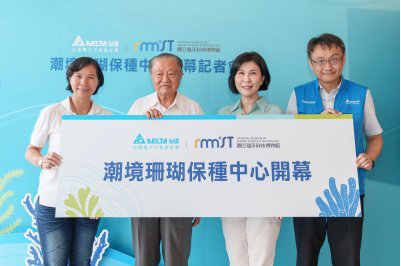Delta Electronics Foundation and the National Marine Science & Technology (NMMST) have jointly announced the opening of the Chaojing Coral Conservation Center on September 23rd with the aim of restoring internationally recognized endangered corals. By leveraging Delta Electronics' expertise in industrial and building automation, and also integrating intelligent aquaculture and environmental management, the Center intends to create a suitable and energy-efficient greenhouse for coral growth. Corals with heat-resistant genes will be selected and transplanted into the Wanghaixiang Chaojing Bay Resource Conservation Area. It is expected that over 10,000 corals will be restored within three years. In addition, Delta will contribute renewable electricity to help the Chaojing Coral Conservation Center eventually become the first of its kind in Asia to reach zero carbon emissions.

Image Credit: Delta Electronics Foundation
Bruce Cheng, Delta’s founder and Chairman of the Delta Electronics Foundation, said, "Global climate change is intensifying, and research by the United Nations expects that 70% to 90% of coral reefs may face extinction while a quarter of marine species may lose their habitat if planet Earth’s average temperature rises above 1.5 °C. Hence, the Delta Foundation launched a coral restoration initiative in 2021. The new Chaojing Coral Conservation Center will bolster our cooperation with the NMMST, with Delta's automation technology supporting key processes within the research of heat-resistant corals. This will help corals in Taiwan and beyond to develop better heat-resistant resilience in the face of more frequent marine heatwaves."
Over and above being only the first coral conservation base in Taiwan to integrate with a marine protected area, the Chaojing Coral Conservation Center is also an important site for environmental education. The public can make an appointment to visit, with the museum curators and Delta volunteers serving as lecturers, and learn the importance of corals in marine ecology. They can also experience planting coral seedlings to protect marine biodiversity and contribute to a healthy ocean.”
Su-Fen Chen, Director-General, NMMST
Shan Shan Guo, Delta’s Chief Brand Officer and Vice Chairman of the Delta Electronics Foundation, underscored, "Keelung is a beautiful city located at the intersection of mountains and sea. It is also seen by experts as the Noah's Ark for corals, as they migrate northward due to the warming of the surrounding waters of Taiwan. The Delta Foundation is honored to collaborate with coral experts from the NMMST. In addition to assisting in the establishment of the center and using in Delta's automated breeding equipment, we are also working together on research projects with experts, and joining hands with conservation organizations to promote and expand marine education. We would like to express our gratitude to the many experts who have guided Delta along the way. We hope that Delta's efforts will encourage more people in Taiwan to value the restoration of coral habitats, and together, become caretakers of coral.”
Source: https://www.delta-foundation.org.tw/en